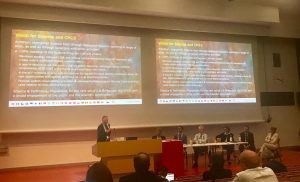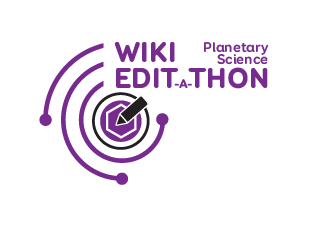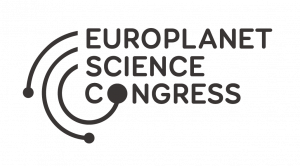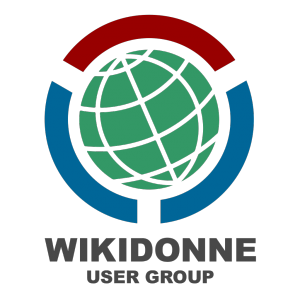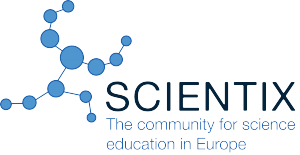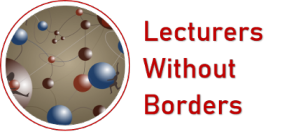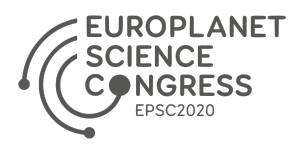Review of Europlanet Virtual Industry-Policy session at EPSC 2020
This guest post by the Europlanet Industry and Policy teams summarises the Industry-Policy session that took place during EPSC2020.
A virtual Industry-Policy session was organised on 29 September 2020 as part of the Europlanet Science Congress 2020 (EPSC 2020), the largest planetary science meeting in Europe.
The session focused on:
- Painting the landscape of planetary research in Europe – future missions and the role of Agencies
- Industry – research collaboration for innovation: the benefits for society and growth
- Funding opportunities; challenging decisions in the context of Horizon Europe in times of crisis
- The essential role of space as a strategic asset for Europe
- Raising awareness of the successes of European Space Programmes, in particular when it comes to inspirational science e.g. planetary sciences, and their potential for innovation
This was a high level event featuring among the main speakers MEPs, EC officials, agency representatives, SMEs and other stakeholders.
The essential role of planetary exploration and the need to maintain generous funding for space programmes was particularly highlighted by the first speaker, MEP and Vice-President of the European Parliament Dimitris Papadimoulis. In the grim landscape of significant budgetary cuts announced by the EU leaders in July 2020 on the overall budget for science and technology, including space, it is important to highlight that: “planetary and space exploration is a human endeavor that encompasses scientific, technological and economic challenges and bears long-term benefits for society. It stimulates innovation, boosts technological development, motivates young people towards highly qualified careers and may lead to unique benefits for the planet”.
Space and planetary science, besides their own merit also teach us about our own planet and how we can live here in a more sustainable fashion.
“When it comes to green and digital transition, I think the space opportunities here are key for achieving it,” said Ville Niinistö, Finish MEP and former Minister of Environment, pointing out that space technology is about exploration but also about sustainability which creates benefits. MEP Niinistö challenged planetary research officials to give public decision makers more tools in order to make better decisions and reach viable solutions.
The need to establish a unique European space strategy was raised by Niklas Nienaß, German MEP, who stressed that: “we need to take the step forward from the science fiction side that we seem to be living in at the moment to the actual science that we actually have”. It is essential for society and politicians to realise how important European space faring programs are how much strategic value is embedded in space, to achieve more funding and establish a unique European Space Strategy. And for this to happen, we need more scientists to lobby politicians, as well as raise the profile of successful EU/ESA missions so that ESA (not just NASA) receives broader society recognition. MEP Nienaß also raised the important issue of science education proposing the establishment of a European Space Academy to introduce young people in all fields concerning space faring.
The EU space policy and funding current and future strategy was outlined by Michal Spiechowicz, of the Space Policy Department of European Commission’s DG DEFIS, who put an emphasis on the need to foster better integration with space assets, in the context of the twin transition that Europe faces. “The EU space programs support both the digital and green callenges: Copernicus to monitor and map Earth, land, seas, and atmosphere, and Galileo, to help us navigate and position. They are in fact, nothing else than global-scale, autonomous European digital infrastructures.” The third EU priority being resilience, Mr Spiechowicz mentioned that, if we work on an ambitious project of secure connectivity by satellites, within five to seven years we could have an alternative European infrastructure that would drastically enhance Europe’s resilience. He also mentioned several upcoming funding opportunities for the space industry in the post-covid context. EU members states could embed data services in their national reform, recovery and resilience programmes, this would enable them to apply for funds under EU Regional and Structural funds.
Fabio Favata from ESA highlighted Europe’s vast capabilities in science and industry. He noted ESA does regular industry days and showcases for member states, and builds up a portfolio of industrial capabilities. As an example, In Hungary, Tamas Bárczy from Admatis Ltd. who has been involved in three ESA missions, presented an association of 45 SMEs in the space sector called HUNSPACE. Fabio Favata also commented that academics shouldn’t feel reserved about speaking with industries and to initiate collaborations; there are great synergies in the skillsets repective to each domain.
The virtual session featured several examples of successful Industry-Academia collaborations. Jörn Helbert, the Department Head of Planetary Laboratories of the German Aerospace Center (DLR), highlighted quite a few: A Berlin facility to do measurements at very high temperatures, funded by the Europlanet 2020 RI project, is an extremely valuable asset for planetary scientists to measure the hot surface of Mercury and the even hotter surface of Venus, look at volcanic surfaces on Jupiter’s moon, Io, etc. And inversely, an example of a direct spin-off from astrobiology research: a team of scientists who are studying the effects of humidity on microbes, so basically how would potential life survive on Mars, are now also working with two small SMEs, developing a trace humidity generator that will be used for industrial applications. He highlighted the two-way nature of this collaboration, with commercial customers using a university facility that contains SME-built equipment.
In a similar manner, Giovanni Martucci (ALTEC) highlighted the value of collaborations between planetary science missions and industry, with the example of ALTEC providing operational support to ESA missions, with a co-located team at the ExoMars ROCC facility.
Finally, Jeronimo Bernard-Salas, from one of our partner companies ACRI-ST, showed that collaborations with academic networks can lead to direct funding, with the success of the H2020 EXPLORE program selection, containing multiple Europlanet member organisations. This programme is based on collaborations with the planetary science community on exploitation of space science data including through the use of machine learning. Jeronimo also highlighted the potential for industry collaborations to valorise academic research, and open the door for new funding opportunities.
A debate has followed the main deliberations, focusing on how Europe’s Planetary Exploration programme can drive innovation and competitiveness in European Research, Industry and SMEs, impact the society and inspire the next generation of Europe’s STEM workforce. The debate was moderated by Nigel Mason and it was possible for viewers to submit questions via the Q&A facility on Zoom. The questions, addressed mostly to the MEPs another policy speakers, concerned a range of subjects such as: best practices for scientists to lobby politicians and the underlying issue of lobbying time conflicting with research priorities, University Master programmes on space as an opportunity for collaboration with industry, or the organisation of large-scale space education opportunities with EU support.
The virtual event was very well attended by ~100 participants. The recording of the full session can be found here.

 Europlanet 2024 RI has received funding from the European Union’s Horizon 2020 research and innovation programme under grant agreement No 871149.
Europlanet 2024 RI has received funding from the European Union’s Horizon 2020 research and innovation programme under grant agreement No 871149.